十六种时态和它们的时间状语
英语中的16种时态(全)

英语中的16种时态(全)动词16个时态一、一般现在时1.概念:表示经常发生的情况;有规律出现的情况;总是发生的;和事实真理。
2.时间状语:Always, usually, often, sometimes, every week (day, year, month…),once a week(day, year, month…),on Sundays(on Mondays …),3.基本结构:动词原形(如主语为第三人称单数,动词上要改为第三人称单数形式)4.否定形式:主语 + am/is/are + no t + 其他;此时态的谓语动词若为行为动词,则在其前加don't,如主语为第三人称单数,则用doesn't,同时还原行为动词。
5.一般疑问句:把be动词放于句首;用助动词do提问,如主语为第三人称单数,则用does,同时,还原行为动词。
6.例句:It seldom snows here.这里很少下雪。
He is always ready to help others.他总是乐于帮助别人。
Action speaks louder than words.事实胜于雄辩。
二、一般过去时1.概念:过去某个时间里发生的动作或状态;过去习惯性、经常性的动作、行为。
2.时间状语:ago, yesterday, the day before yesterday, last week, last(year, night, month…),in 1989,just now, at the age of 5,one day, long long ago, once upon a time, etc.3.基本结构:主语 + 动词的过去式或be的过去式+名词4.否定形式:主语 + was/were + not + 其他;在行为动词前加didn't,同时还原行为动词。
5.一般疑问句:was或were放于句首;用助动词do的过去式did提问,同时还原行为动词。
英语十六时态总结
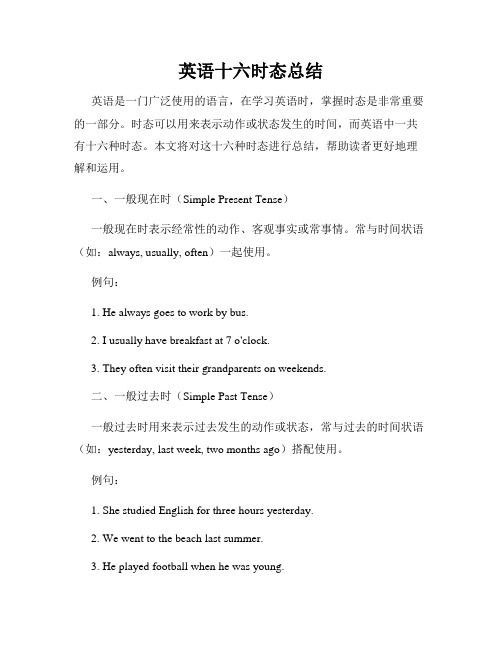
英语十六时态总结英语是一门广泛使用的语言,在学习英语时,掌握时态是非常重要的一部分。
时态可以用来表示动作或状态发生的时间,而英语中一共有十六种时态。
本文将对这十六种时态进行总结,帮助读者更好地理解和运用。
一、一般现在时(Simple Present Tense)一般现在时表示经常性的动作、客观事实或常事情。
常与时间状语(如:always, usually, often)一起使用。
例句:1. He always goes to work by bus.2. I usually have breakfast at 7 o'clock.3. They often visit their grandparents on weekends.二、一般过去时(Simple Past Tense)一般过去时用来表示过去发生的动作或状态,常与过去的时间状语(如:yesterday, last week, two months ago)搭配使用。
例句:1. She studied English for three hours yesterday.2. We went to the beach last summer.3. He played football when he was young.三、一般将来时(Simple Future Tense)一般将来时表示将来要发生的动作或状态,常与将来的时间状语(如:tomorrow, next week, in a month)一起使用。
也可使用助动词(will)来构成一般将来时。
例句:1. I will meet my friends tomorrow.2. They are going to travel to Europe next month.3. She will send you an email later.四、现在进行时(Present Continuous Tense)现在进行时用来表示现阶段正在进行的动作或状态,通常与现在进行时的标志词(如:now, at the moment)连用。
英语的16种时态
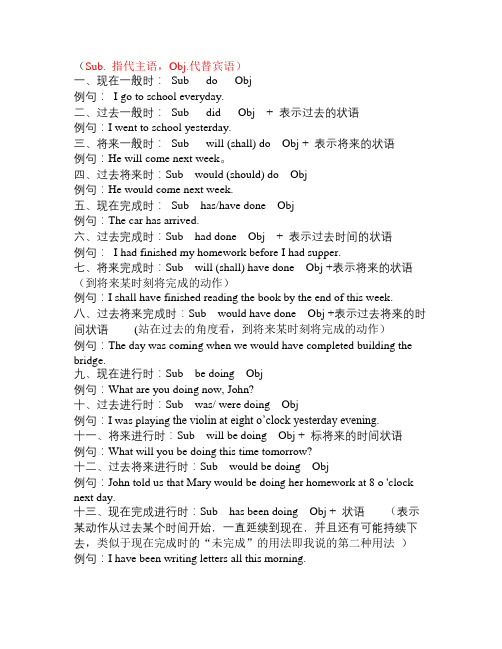
(Sub. 指代主语,Obj.代替宾语)一、现在一般时:Sub do Obj例句:I go to school everyday.二、过去一般时:Sub did Obj + 表示过去的状语例句:I went to school yesterday.三、将来一般时:Sub will (shall) do Obj + 表示将来的状语例句:He will come next week。
四、过去将来时:Sub would (should) do Obj例句:He would come next week.五、现在完成时:Sub has/have done Obj例句:The car has arrived.六、过去完成时:Sub had done Obj + 表示过去时间的状语例句:I had finished my homework before I had supper.七、将来完成时:Sub will (shall) have done Obj +表示将来的状语 (到将来某时刻将完成的动作)例句:I shall have finished reading the book by the end of this week. 八、过去将来完成时:Sub would have done Obj +表示过去将来的时间状语 (站在过去的角度看,到将来某时刻将完成的动作)例句:The day was coming when we would have completed building the bridge.九、现在进行时:Sub be doing Obj例句:What are you doing now, John?十、过去进行时:Sub was/ were doing Obj例句:I was playing the violin at eight o’clock yesterday evening.十一、将来进行时:Sub will be doing Obj + 标将来的时间状语 例句:What will you be doing this time tomorrow?十二、过去将来进行时:Sub would be doing Obj例句:John told us that Mary would be doing her homework at 8 o 'clock next day.十三、现在完成进行时:Sub has been doing Obj + 状语 (表示某动作从过去某个时间开始,一直延续到现在,并且还有可能持续下去,类似于现在完成时的“未完成”的用法即我说的第二种用法)例句:I have been writing letters all this morning.十四、过去完成进行时:Sub has been doing Obj + 表示过去时间的状语 (表示一个持续到过去某时刻的动作,到过去某一点之前,一直在做某事)例句:The telephone had been ringing for three minutes before I answered it.十五、将来完成进行时:Sub will (shall) has been doing Obj + 表示将来某一时间的状语 (从某一时间开始一直延续到将来某一时间,还可能持续下去)例句:The play will have been running(上映)for three months by(完成时的标志)the end of next week.十六、过去将来完成进行时:Sub would has been doing + 状语 (从过去的角度看,未来某时刻之前会一直发生的动作,可能继续)例句:He said that by(完成时的标志)the end of this term he would have been studying English for three years.没学的,看不懂的,不要急,慢慢学,有些比较复杂的,高中才会学。
各时态常用时间状语总结

各时态常用时间状语总结常用时间状语有:1.每天/周/月/小时/十分钟,每隔一天/两天/几天。
2.早上/下午/晚上,在晚上。
3.每周一次,每年两次。
4.经常,通常,频繁地,总是,有时,偶尔,从不,很少。
5.在每个星期天。
6.现在,目前,暂时,现在就,总是。
现在进行时常用时间状语:1.现在,此刻,目前,暂时。
2.总是。
现在完成时常用时间状语:1.for + 一段时间,since + 点时间,如ever since,since then。
2.在过去的30年里,在过去。
3.最近,刚刚,这些日子。
4.到目前为止,直到现在。
5.肯定的ever,否定的never。
6.肯定的already,否定的yet。
一般过去时常用时间状语:1.一般现在时的时间状语+一个过去的时间,如every day last year,on Sundays last year。
Yesterday。
just now。
and the other day are all examples of time XXX。
phrases like last year。
last night。
and last month refer to specific points in the past。
When using time clauses introduced by when。
XXX is often used to describe an n that was in progress when another n occurred。
For example。
"I was watching TV when he came in." It is XXX present continuous tense。
it XXX n in the present.The past perfect tense is used to XXX before another past n。
16种时态及语态总结
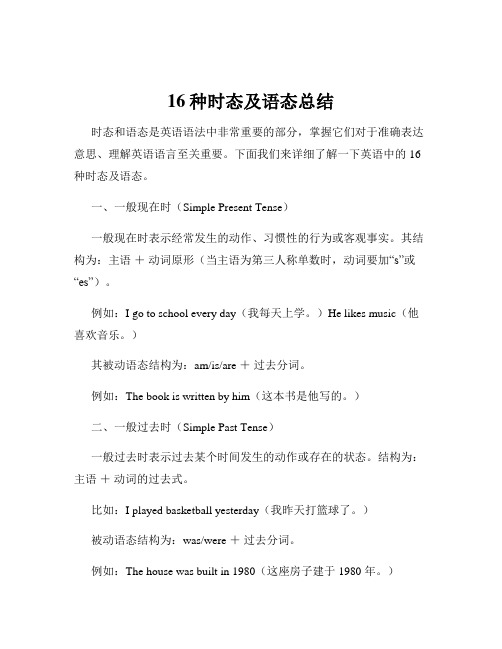
16种时态及语态总结时态和语态是英语语法中非常重要的部分,掌握它们对于准确表达意思、理解英语语言至关重要。
下面我们来详细了解一下英语中的 16 种时态及语态。
一、一般现在时(Simple Present Tense)一般现在时表示经常发生的动作、习惯性的行为或客观事实。
其结构为:主语+动词原形(当主语为第三人称单数时,动词要加“s”或“es”)。
例如:I go to school every day(我每天上学。
)He likes music(他喜欢音乐。
)其被动语态结构为:am/is/are +过去分词。
例如:The book is written by him(这本书是他写的。
)二、一般过去时(Simple Past Tense)一般过去时表示过去某个时间发生的动作或存在的状态。
结构为:主语+动词的过去式。
比如:I played basketball yesterday(我昨天打篮球了。
)被动语态结构为:was/were +过去分词。
例如:The house was built in 1980(这座房子建于 1980 年。
)三、一般将来时(Simple Future Tense)一般将来时表示将来要发生的动作或存在的状态。
结构有多种,常见的有:will +动词原形;be going to +动词原形。
例如:I will visit my grandparents next week(下周我将去看望我的祖父母。
)She is going to have a party(她打算举办一个聚会。
)其被动语态结构为:will be +过去分词;be going to be +过去分词。
比如:The meeting will be held tomorrow(会议将在明天举行。
)The show is going to be cancelled(这个演出将要被取消。
)四、现在进行时(Present Continuous Tense)现在进行时表示正在进行的动作。
英语十六种动词时态归纳表
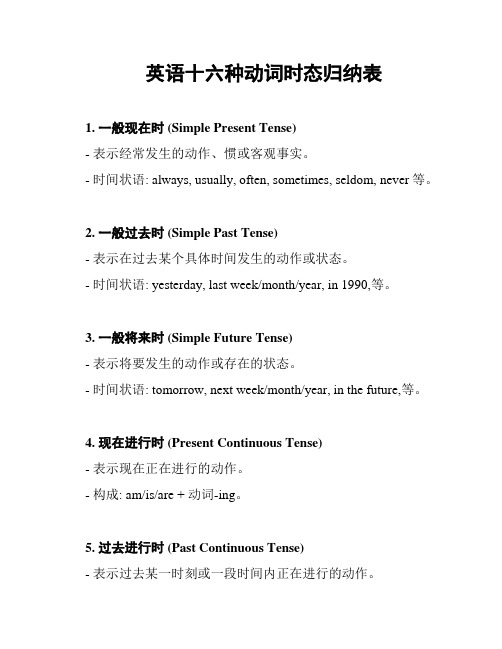
英语十六种动词时态归纳表1. 一般现在时 (Simple Present Tense)- 表示经常发生的动作、惯或客观事实。
- 时间状语: always, usually, often, sometimes, seldom, never等。
2. 一般过去时 (Simple Past Tense)- 表示在过去某个具体时间发生的动作或状态。
- 时间状语: yesterday, last week/month/year, in 1990,等。
3. 一般将来时 (Simple Future Tense)- 表示将要发生的动作或存在的状态。
- 时间状语: tomorrow, next week/month/year, in the future,等。
4. 现在进行时 (Present Continuous Tense)- 表示现在正在进行的动作。
- 构成: am/is/are + 动词-ing。
5. 过去进行时 (Past Continuous Tense)- 表示过去某一时刻或一段时间内正在进行的动作。
- 构成: was/were + 动词-ing。
6. 将来进行时 (Future Continuous Tense)- 表示将来某一时刻或一段时间内正在进行的动作。
- 构成: will be + 动词-ing。
7. 现在完成时 (Present Perfect Tense)- 表示动作对现在造成的影响或状态。
- 构成: have/has + 过去分词。
8. 过去完成时 (Past Perfect Tense)- 表示在过去某一时间点或动作之前已经发生的动作。
- 构成: had + 过去分词。
9. 将来完成时 (Future Perfect Tense)- 表示在将来某一时间点之前将会发生的动作。
- 构成: will have + 过去分词。
10. 现在完成进行时 (Present Perfect Continuous Tense)- 表示从过去某一时刻开始一直延续到现在且可能继续下去的动作或状态。
高中英语十六种时态

添加标题
定义:一般现在时表示习惯或 常规,通常用于描述经常发生 的动作或状态。
添加标题
用法:一般现在时通常与频度 副词如“always”、 “often”、“sometimes” 等连用,表示某个动作或状态 发生的频率。
添加标题
形式:一般现在时的形式是动 词原形,第三人称单数时在动 词后加“-s”或“-es”。
注意事项:在使 用一般现在时描 述客观事实或普 遍真理时,要注 意避免使用主观 性的词汇或语气, 保持客观和中立 的态度。
定义:表示正在进行的动作或存在的状态
构成:be动词+动词ing
用法:可以表示现在正在进行的动作或存在的状态,也可以表示将来要发生的动作或存在 的状态
示例:I am studying English right now.(我现在正在学习英语。)
,
01 一 般 现 在 时 02 现 在 进 行 时 03 现 在 完 成 时 04 现 在 完 成 进 行 时
定义:一般现在时表示现在发生的动作或状态,常与一般现在时的基本用法相联系 构成:动词原形或第三人称单数形式 时间状语:always,usually,often,sometimes,every day等 基本用法:表示习惯性、经常性、普遍性的动作或状态
构成:have/has+过去分词 用法:动作或状态从过去开始,持续到现在或将来 时间状语:already, yet, just, before, since等 语境:常与现在完成时连用,表示过去的动作对现在造成的影响或结果
定义:现在完成时表示过去发生 的动作或状态对现在造成的影响 或结果。
用法:常与already, yet, just, ever, never等副词连用。
最新英语时态的16种时态时间轴说明
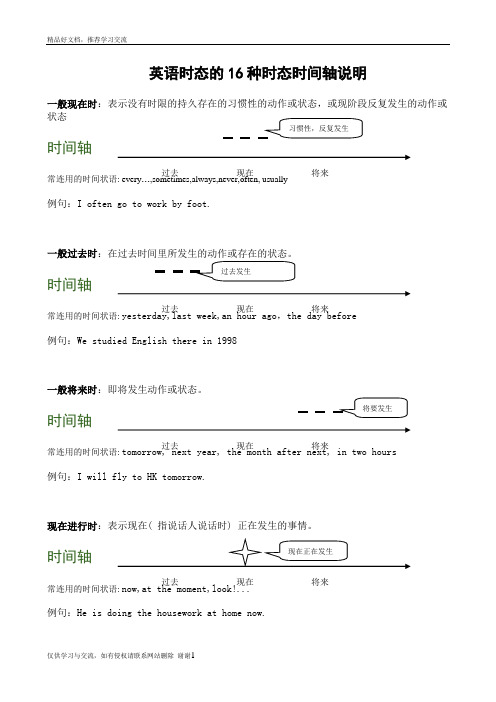
英语时态的16种时态时间轴说明一般现在时:表示没有时限的持久存在的习惯性的动作或状态,或现阶段反复发生的动作或状态时间轴常连用的时间状语: every …,sometimes,always,never,often, usually 例句:I often go to work by foot.一般过去时:在过去时间里所发生的动作或存在的状态。
时间轴常连用的时间状语: yesterday,last week,an hour ago ,the day before例句:We studied English there in 1998一般将来时:即将发生动作或状态。
时间轴常连用的时间状语: tomorrow, next year, the month after next, in two hours例句:I will fly to HK tomorrow.现在进行时:表示现在( 指说话人说话时) 正在发生的事情。
时间轴常连用的时间状语: now,at the moment,look!... 例句:He is doing the housework at home now.将来现在 过去 将来 现在 过去 将来 现在 过去 将来现在 过去过去进行时:过去某个时间正在发生的动作。
时间轴 常连用的时间状语: at that time, at 10 o’clock last night ,at that moment例句:I was doing my homework at that time.将来进行时:将来某个时间正在发生的动作。
时间轴 常连用的时间状语: This time tomorrow, at 9 o ’clock tomorrow, in a minute例句:This time tomorrow they will be sitting in the cinema..现在完成时:用来表示之前已发生或完成的动作或状态,其结果的确和现在有联系。
- 1、下载文档前请自行甄别文档内容的完整性,平台不提供额外的编辑、内容补充、找答案等附加服务。
- 2、"仅部分预览"的文档,不可在线预览部分如存在完整性等问题,可反馈申请退款(可完整预览的文档不适用该条件!)。
- 3、如文档侵犯您的权益,请联系客服反馈,我们会尽快为您处理(人工客服工作时间:9:00-18:30)。
1. —I don’t understand why you come so late?-Sorry, I ________ that you ________ for me.A. don’t realize, are waitingB. haven’t realized, have waitedC. hadn’t realized, had waitedD. didn’t realize, were waiting2. We _________ in the forest for more than two days when it became obvious that we neededa guide.A. had not beenB. were notC. have not beenD. would not be3. —Are you going to Emma’s party?—I don’t know. It_______.- We might go away that weekend.A. all dependB. all dependsC. is all dependedD. all is depending4. — When is the meeting supposed to start?—It is _______.A. about to beginB. to beginC. already begunD. about beginning5. — You seem to have a lot of work at your office. You ______ late.-That’s true, but it’s no bother to me.A. stay alwaysB. are always stayingC. were always stayingD. had always stayed6. I’d _________ if you’d mail these letters for me.A. very appreciate itB. fairly appreciateC. quite appreciateD. appreciate it very much7. We _________ successes so far, but the successes _________ in one day.A. have won, haven’t been wonB. won, weren’t wonC. had won, hadn’t been wonD. have won, weren’t won8. When you go by train; make sure you ________ train that stops at all the stations.A. will getB. would getC. getD. should get9. -She _______ but that young man dived in and saved her just in time.-How brave of him!A. had drownedB. drownedC. was drownedD. was drowning10. This tape recorder is easy to work. Watch how I_______ it. I switch it on, press this button and it starts.A. have doneB. doC. would doD. was doing11. He asked the crowd if they _______ that she __________ a lie.A. had thought, toldB. thought, was tellingC. were thinking, toldD. were thinking, was telling12. More middle-aged people suffer from heart trouble than _______.A. general beliefB. generally believedC. believing generallyD. to believe generally13. No wonder those flowers ________. They ________ any water for long.A. are dy ing, haven’t hadB. died, didn’t haveC. had died, haven’t hadD. have died, hadn’t had14. -How long have you been here?-Only about five minutes. Henry and Simon ____ with me.A. have walkedB. were walkingC. had walkedD. walked15. -You mean your gas and electricity bill isn’t correct._______you still __________ it?—No.A. Are, going to payB. Had, paidC. Were, payingD. Would, have paid16. -You’ve been telephoning for ages. Aren’t you going to finish it?-I ________ through yet. The line has been busy all morning.A. haven’t gotB. don’t getC. hadn’t gotD. didn’t get17. -It’ll be the first time I _________ the subject.-Don’t worry. It’ 11 be a bit difficult the first time you ______ it.A. have taught, teachB. teach, have taughtC. will teach, will teachD. have taught, will teach18. -Is Tim a good manager?— I think he lacks the experience he _________ for such a job.A. should haveB. should have hadC. need haveD. must have had19. He gave us warning to stay from the machine while it ________.A. had workedB. was workingC. would workD. would be working20. I _________ the book on the reading list before I attended the lecture.A. have readB. would have readC. had readD. read21. He is ill. He _________ in bed for 3 weeks.A. is lyingB. has been lyingC. has lainD. lay22. My uncle _________ until he was forty-five.A. marriedB. didn’t marryC. was not marryingD. would marry23. He will have learned English for eight years by the time he _________ from the university next year.A. will graduateB. will have graduatedC. graduatesD. is to graduate24. -Will you go skiing with me this winter vacation?—It _______.A. all dependB. all dependsC. is all dependedD. is all depending25. The new suspension bridge ________ by the end of last month.A. has been designedB. had been designedC. was designedD. would be designed26. When Jack arrived he learned Mary _________ for almost an hour.A. had goneB. had set offC. had leftD. had been away27. -Do you know our town at all?— No, this is the first time I __________ here.A. wasB. have beenC. cameD. am coming28. -We could have walked to the station; it was so near.— Yes. A taxi _________at all necessary.A. wasn’tB. hadn’t beenC. wouldn’t beD. won’t be29. Tom ________ into the house when no one ________.A. slipped, was lookedB. had slipped, lookedC. slipped, had lookedD. was slipping, looked30. -Oh, it’s you! I _______ you.-I’ve just had my hair cut,and I’m wearing n ew glasses.A. didn’t recognizeB. hadn’t recognizedC. haven’t recognizedD. don’t recognized31. — Can I join your club, Dad?-You can when you ________ a bit older.A. getB. will getC. are gettingD. will have got32. She set out soon after dark_______ home an hour later.A. arrivingB. to arriveC. having arrivedD. and arrived33. —I’m sorry to keep you waiting.-Oh, not at all. I _________ here only a few minutes.A. have beenB. had beenC. wasD. will be34. I don’ t really work here; I _____ until the new secretary arrives.A. just help outB. have just helped outC. am just helping outD. will just help out35. If a man _________ succeed, he must work as hard as he can.A. willB. is toC. is going toD. should36. It is believed that a book is _________ it will surely __________ the reader.A. interested, interestB. interesting, be interestedC. interested, be interestingD. interesting, interest37. You _______ the umbrella. Don’t you think it silly to carry an umbrella on such a fine day?A. mustn’t have broughtB. didn’t have to bringC. needn’t have broughtD. didn’t need to bring38. I’d rather you ________ anything about it for the time being.A. doB. didn’t doC. don’t doD. not did39. ________ from school for almost two weeks, so she is working harder to make up for the lost time.A. Being absentB. Having been absentC. Because she has been absentD. She has been absent40. The earlier ________ start work tomorrow, the sooner ________ finish.A. we’ll, weB. we, we’llC. we’ll, we’llD. we, /41. In addition to John and Helen, their father _____ visit us tomorrow.A. is coming toB. are coming toC. are toD. is likely42.-You look happy today, Jane.-I like my new dress and Mother _________, too.A. likesB. doesC. doD. is43. Because of the shortage of coal in England, attempts _______use natural gas as source of power.A. have madeB. having madeC. are being madeD. will be making44. He is late again today. I’ll _________ that he will not be late tomorrowA. be sureB. hope forC. see to itD. make it to45. _________, it went off unexpectedly.A.While cleaning the gunB. While he was cleaning the gunC. To clean his gunD. Cleaning his gun46. “There _________ the bell. Class begins,” sa id the teacher.A. will goB. goC. would goD. goes47. The happy moment I had looked forward to ________ at last.A. cameB. comingC. comeD. to come48. Tom has just arrived, but I didn’t know he ________ until yesterday.A. had comeB. was comingC. cameD. will come49. When I ________ across a new word, I look it up in the dictionary.A. comeB. will comeC. have comeD. came50. The museum he paid a visit _________ at the end of the street.A. standB. standsC. to standD. to stands51. We have to go to the seaside in his car because ours _________ fixed.A. wasn’tB. haven’tC. hasn’t beenD. hadn’t been52. He said he felt bad because he _________ late the night before.A. sit upB. was sitting upC. has sit upD. had been sitting up53. Until he was married, he _________ any new clothes.A. has not hadB. doesn’t haveC. has notD. did not have54. By the end of the 18th century the city’s population _______ about two million.A. wasB. wereC. had beenD. being55. — Excuse me, where could I find Mr. Cook?— He _________ in his office at the moment.A. should workB. should be workingC. could workD. must have worked56. -Did Billy play well in the first half?—I’m afraid he _________. I expect he’ll do better in th e next half.A. was disappointingB. is disappointedC. disappointedD. would disappoint57. When the film _________ , a crowd of people stopped to watch it so that traffic came toa stop.A. was being shotB. was shotC. was shootingD. shot58. Wan g Li, I don’t think you _______ Feng Yang, a newcomer to our class.A. having metB. to have metC. have metD. had met59. — Have you brought my book?— Oh no! I ________ again. That was stupid of me.A. forgotB. have forgottenC. had forgottenD. forget60. The Palmers chose to buy the house as its surroundings ________ clean and quiet.A. wasB. beingC. had forgottenD. forget61. I _____ TV when the light went out.A. watchedB. would watchC. was watchingD. had watched62. We ________ the roof of our house last night, and we’re going to complete it today.A. repairedB. had repairedC. would repairD. were repairing63. – Oh, Mary. What shall we do with our son? He _____ things about.--It’s really annoying.A. is always leavingB. has always leftC. always leavesD. always left64. The flower show, which _____ until 5 p.m. every day, has been a complete success.A. opensB. is openC. openingD. is opened65. He told me he _____ there the next day.A. will goB. has goneC. had goneD. would go66. Roman Empire ________ for centuries.A. has existedB. had existedC. existedD. was existed67. -- What’s the trouble?-- Dr. William, yesterday we were playing basketball when I fell on my knee. It ____ever since then.A. had hurtB. had been hurtC. has hurtD. has been hurt68. I was _____ for the beach, forgetting my appointment with the dentist, when my mother reminded me.A. to leaveB. to be leavingC. about to leaveD. to have left69. He knew I collected stamps and coins and asked me whether my collection ______.A. was growingB. was grownC. grewD. had been grown70. We hurried to the school gate, amazed to see that our school bus ____ already _____ out in the street.A. had, waitedB. /, waitedC. was, waitingD. /, waiting71. Doctors, it seems that I ________ my breath. It has been like that for weeks.A. always catchB. have always caughtC. will always catchD. am always catching72. In Japan when we spent the night at a small country, we ________ so low on the floor before.A. haven’t ever sleptB. wouldn’t have sleptC. hadn’t ever sleptD. couldn’t have slept73. -- Mr. Jones, this is Carlo. I ____ because I’m going to the movie after school. So I’ll be absent for dinner.-- That’s OK.A. phoneB. have phonedC. am phoningD. was phoning74. -- You see we’ve been invited to Kathy’s party. Don’t forget to call for me tonight, and we’ll go together.— Oh, _______, Thank you for reminding me.A. I’d almost forgottenB. I’ve almost forgottenC. I’d ha ve almost forgottenD. I almost forgot75. Sir, I’ll have your luggage brought in while you _______ in this form.A. are fillingB. have filledC. have been fillingD. will fill76. – I’m so sorry. I ____ some coffee on your book.-- That’s all right.A. had spilledB. have spilledC. having spilledD. spill77. After the interview, she realized that she had no useful skill that _________ her boss.A. was interestingB. interestedC. would be interestedD. interested in78. ________ the people rose up.A. Long beforeB. It was before longC. It was not long beforeD. It was not before long79..。
